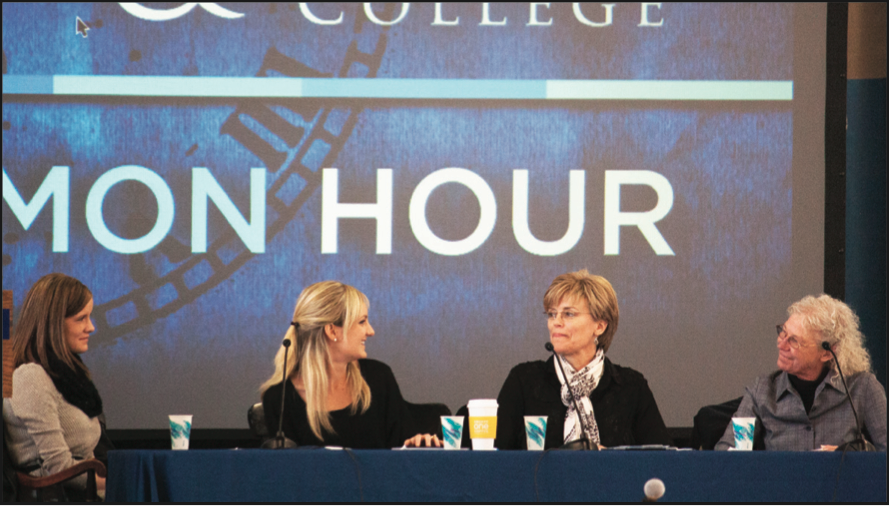Staff Writer
Thursday’s Common Hour addressed the under-recognized, heinous crime of sex trafficking. The talk featured Morgan Perry, executive producer of the documentary film Sex+Money: A National Search for Human Worth, Pamela Pillsbury, co-director of the Pennsylvania Regional Center for Public Safety Innovation, and Bethany Woodcock, director of Not In My Backyard (NIMBY).
Human sex trafficking is a problem worldwide, with an estimated 1.2 million children and youth sexually exploited each year. Unfortunately, the United States remains blind with regard to the staggering amount of sex trafficking currently occurring within its borders. About 80 percent of sex trafficking victims in the U.S. are female and about 50 percent are children. It is estimated that 100,000 children per year are being trafficked in the U.S. and the average age of sex trafficking victims is 13 to 14 years old.
“We don’t want to make the mistake of thinking this is a class issue, or strictly a poverty issue. Nor is it limited to a sector of society; victims in this country are male, are female, are young, are old,” Woodcock said.
Just as there is no one type of victim, there is no stereotypical pimp. Woodcock shared a story about a 16-year-old girl being sold for drugs by her mother. This had been happening for a period of time before the young girl found the courage to say something to a friend and ask for help.
“We have people who are being raped 10 times, 20 times a day, seven days a week, 365 days a year,” Woodcock said.
According to Perry, the statistic of 100,000-300,000 kids involved in trafficking is equivalent to about three or four full NFL football stadiums. These children are being sexually exploited and, at a minimum, being forced to have sex at least five times a day. So, the smallest number of those kids — 100,000 — having sex five times a day is a half a million rapes of kids in the United States per day.
“When that light bulb went off for me, I realized that this was a national crisis,” Perry said. “If any other crime were happening half a million times per day in the United States, the public would be in an uproar.”
So why does the United States remain blind in regard to this issue?
“I think we’re all willing to admit that this is happening but many, many of us won’t recognize that it’s happening here; they don’t want to acknowledge that,” Woodcock said.
While making her documentary, Perry was told a heartbreaking story of a married couple in Texas that had been running an online business called “babyrape.com.” At the time of arrest, they had more than 70,000 online subscribers paying $29.95 to get images of babies and toddlers being sexually assaulted and raped.
Who were the buyers? Who were the 70,000? The answer: anyone imaginable.
“They couldn’t stereotype the buyer and, for me, that painted the picture that this is not just a few people going down back alleys,” Perry said.
Like the pimps and the victims, the buyers in the sex trafficking industry, otherwise known as “Johns,” can be anybody. Doctors, lawyers, and teachers have all been arrested. The majority of buyers even had a wife or a girlfriend at the time, and most knew the psychological, irrevocable harm of sex trafficking.
This is not only occurring in big cities, either. Pillsbury shared a story about a pimp in Reading, Pennsylvania who was nicknamed “God” and actually went to city council to ask that his name be legally changed. Half the girls he was trafficking were underage. He would name the girls things such as “God’s angel” and “God’s devil” and then have it tattooed onto their bodies.
What can be done in Pennsylvania to eliminate human sex trafficking? Arguably the most important thing that needs to be done is educating the community, citizens as well as law enforcement.
“One [recommendation] was that we create a Pennsylvania task force so that we can begin to educate law enforcement and the judiciary because very, very often — and I do a lot of work with law enforcement — I talk to a police chief and they have no idea we have a law in Pennsylvania for human sex trafficking” Pillsbury said.
Simply increasing people’s awareness of this issue can do so much. Woodcock told a story regarding a recently received tip about a nail salon in Harrisburg, Pennsylvania.
“This nail salon was reported to us because of a UPS driver who thought that it was odd that all of the packages going there were from Victoria’s Secret,” Woodcock said.
He had been educated about trafficking and thus was able to more readily recognize when something was not right.
Legislation, like community education, is lacking. It was not until 2006 that Pennsylvania passed its first law regarding human trafficking. Prior to that law, a victim would have had to cross the border into a state such as New Jersey in order to be considered a trafficking victim. However, despite the new legislation, it was only this past Spring that Pennsylvania had its first sex trafficking prosecution.
To help eradicate sex trafficking, awareness needs to be increased amongst citizens and law enforcement alike, not only in Pennsylvania but also throughout the United States, and work needs to be done to continue establishing new legislation. Yes, money is an issue, but the cost of doing nothing is much more. The people need to put more pressure on our senators and representatives.
As Woodcock accurately stated: “[Human sex trafficking] is not going away until we make it go away.”
Questions? Email Caroline at cpitknin@fandm.edu.
